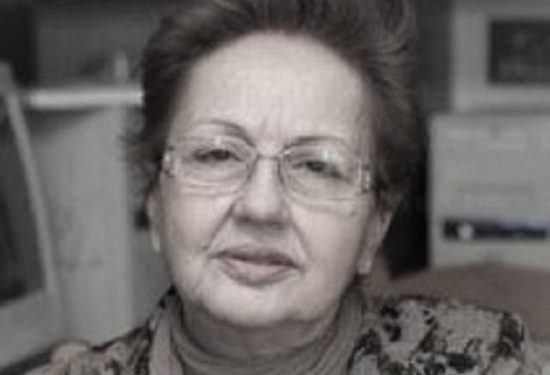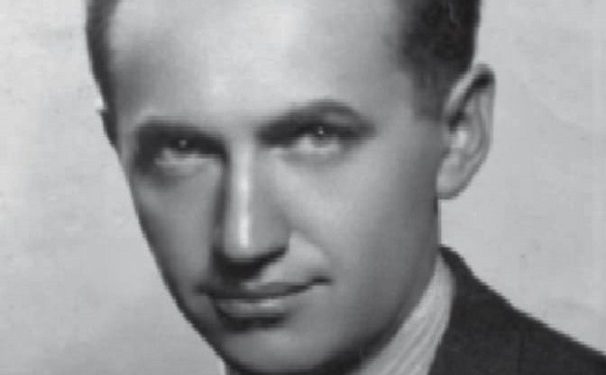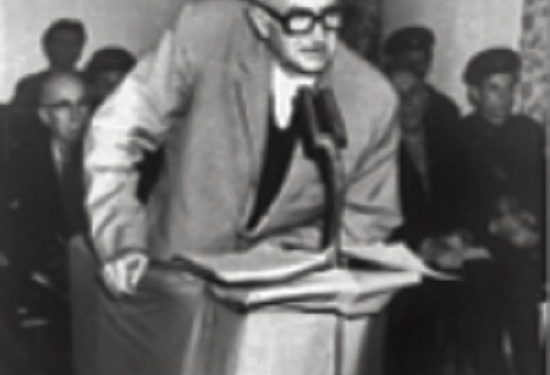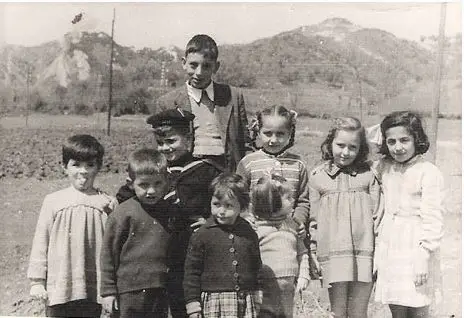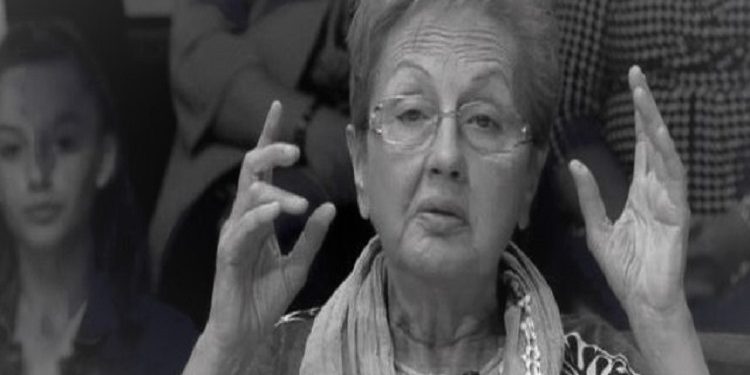By Ani Jaupaj
Memorie.al / The daughter of former minister Vasil Kati, told her life from Moscow, where she was friends with Stalin’s granddaughter in Beijing. Returning to Tirana, gymnasium and the class of “geniuses”, the father’s sentence to 15 years in prison, the separation from the husband and the exile of the whole family. How Kozara Kati’s life continued, from being a follower of Mother Teresa’s sisters, to the Albanian Center for Human Rights. Just when you think you’ve got your life on track, everything can turn upside down. But you will submit to it, you can’t help it. Until, this “second fate” will become yours, even though you can’t forget the first one. When she was a child, she walked around the world holding her father’s hand, Kozara Kati, the daughter of the former minister at the time of the dictatorship, Vasil Kati, probably thought that for her, life would always be smiling.
He would complete his studies, get a job, and create a family, so he would strictly follow the ritual offered by the life of the 70s. So he did! It didn’t go beyond the guidelines! But as you all know, there could well be others. To have everything turned upside down, which you had built with your own hands, and to suddenly find yourself working in agriculture, in a country whose name you had never even heard of. As a result of the accusations made against her father, Kozara Kati, along with the whole family, mother, sister, brother and two-year-old son, who she kept after the broken marriage, were exiled.
They lived in exile for 15 years, during which they only saw their father in prison. If you now make any connection between the recent news images and her, yes, this is the connection. In addition to being the head of the Albanian Center for Human Rights, Kozara was found every day near the made-up tent of the former prisoners, to visit them, because she felt herself a part of them. She and her family, yesterday, there cleaning the canals, could have been with the mother of any of the strikers who, in those days, swore they would die there, on the street, in the rain. Kozara’s comings and goings to them made us turn to her to tell us her story. From childhood, when, unlike her friends, she was lucky enough to walk in Moscow and Beijing, until she was left alone, with her little son, to raise.
Ms. Kati, because of the positions of the father, the childhood was coveted by many of your peers… tell us about it…?
At that age, of course, he does not understand this, despite the fact that he lives differently from others. My childhood was spent walking from one place to another. After elementary school, I finished school in Moscow, because my father was appointed there, as a representative of Albania, in the Economic Council of Eastern Countries. There, I was a classmate of Svjetllana Vasilvijena Stalin, Stalin’s niece. We also had the apartments on the same floor.
So you also had access to the house…what do you remember from that house?
She didn’t talk much about her grandfather, Stalin, and neither did her family. I remember only that they told us about the gifts he had given them. I remember a small piano, crystals, some valuable furniture, like a rosewood sideboard. I learned late that Svjetllana’s father was in prison, but while we were there, they never spoke to him. Even after leaving Moscow, I continued my correspondence with him, until it was stopped because of me, the time came when I could no longer send him letters. After the 1990s, I learned that their family was tragically extinguished.
How long did you stay in Moscow?
We stayed for 3 years, and then due to the breakdown of relations in ’61, we left. We went to Beijing, where my father was appointed again, as a representative of Foreign Trade. We stayed there for 3 years.
In China, you were older; you could get more taste from that faraway place…?
Even though I was younger in Moscow, I managed to see and know a lot, I got acquainted there with the works of the great classics, I followed the artistic life of the city, music, ballet, galleries. I was with the class in “Red Square”, after Yuri Gagarin returned from space. They were things I was seeing for the first time and the memories remain engraved forever. In China, we were first put into a Russian school, because of the language. Then an Albanian school was opened there within the community. A scar of that time is that I shook hands with the last emperor, I saw Mao Zedong, I toured the most beautiful cities of China.
I remember a lunch where, due to tradition, we had to eat 30 types of food, and when, after these 30, we got the not-so-tasty dessert, we took it with us and pretended we forgot it on the train. We were brought back to the hotel the next morning. But I don’t only have beautiful memories from China. While we were there, a very serious event happened for Albania. A plane bound for Tirana, burned at the Irkutsk Airport, with 7 Albanians inside.
Felek Malile was in it, together with his two children, Miranda and Besniku, the great poet, Drago Siliqi, Xhafer Bakllamaja, with his wife Nadire and their little son, Gimin. My mother accompanied them when they left, and when we learned the news, the experience was very painful. We all lived there together. It was a terrible moment when they were brought to Beijing.
We immediately moved on to living abroad, without talking about the family here, in Tirana…
I was born here in Tirana, my father from Labova e Kryqi i Gjirokastra, while my mother is from Korça. My father was part of the National Liberation Movement, battalion commissar, and in 1945 political commissar in the Vlora district. Later he came to Tirana, where he was appointed to leadership positions, as Minister of Economy, Deputy Minister, and Minister of Trade.
In 1964 he returned to Tirana, it was high school time…?
Yes, I was at the “Petro Nini” high school. It was a very nice time, because we were a compact class, we had both the tension of studies, but also the time of humor and fun. There were many names in that class who became known in different fields: Mariglen Spiro, Svjetllana Dume, Skënder Gjinushi, Pal Jumari, Maks Mema, Ilir Hoxha, Gux Bekteshi, Pavli Zëri, Shpresa Shamblli, Iskra Qafzezi and many others others. Such good friends, I had from the time I went to kindergarten, my parents took us everywhere together with Shpresa, Sokol and Spartak Ngjela, Mira and Etleva Klos, Nina and Ben Theodhos.
You must have been a good class; Enver Hoxha’s son was among you, where must all their eyes have been at that time…?
In fact, this was not felt between us. I have never noticed that Iliri demonstrated signs of superiority. He was a student like everyone else, average in results; I can’t say that he shone, although he did not stand out for any ambition.
But who “shined”, there were, while some names have been heard all these years…?
Yes, he was an absolute, Skënder Gjinushi. He was the genius of mathematics, who solved all the exercises in an exemplary manner, without looking at the theory. It was said then, when we were in the first year, that he also chose the exercises of his sisters, who were in the fourth year. We gathered before the exams and he chose the exercises for everyone. It is assumed that you find such, they were divided into categories, and he belonged only to mathematics, because in other branches, he got 4, but he still smiled.
What happened to you after high school?
I went to the Faculty of Foreign Languages, where I graduated in Albanian and English that was the diploma at that time. Unlike the gymnasium, the society of this period could not be the same anymore; however it was the time of academic formation. Thanks to the pedagogues of that time, I felt like a lady later, when I became a teacher myself, at the School of Foreign Languages. It has been a job that I have found myself very well because I tend to collaborate and communicate with people of all ages.
Even though you found yourself, they wouldn’t let you do this job for long…?
No, because in 1975, everything we had built up throughout our lives was turned upside down. My father was arrested, with the “Economic saboteur group”, together with Kiço Ngjela and Avdyl Këllezin, accused as; “poli-agent who damaged the country”. None of these charges were ever proven, but the sentence was handed down anyway, he was sentenced to 15 years in prison. It started from Ballshi, Zejmeni and ended in Qafë-Bari. After his imprisonment, measures would definitely be taken for the family as well. They took us to the village of Ndrnennas in Fier, where my grandmother also died, because no one came to cure her of her illness, and then they took us to Kote in Vlora, then to Sheqes in Berat.
The whole family was exiled; you weren’t married in the meantime?
Yes, the whole family, my mother Fedra, grandmother Fotini, sister Pranvera, brother Adriani, son Denisi and me. At that time I was married, but because of this event, my husband ended the marriage and I went into exile with my son, Danny, who was 2 years old. My sister had the same fate as me.
So everything you had built was cut in half…?!
Another life began, which no one had thought of before. Those who have lived it, who are not few, know what it is. However, if you try to find one good thing from everything that happened, you will find it. At least we were all together and that helped keep everyone’s sanity. We left there, full of hope for the future, as we did not let our hopes die. All of this, without a doubt, is the merit of the mother that the day kept us with courage even in the midst of what happened, that the day, despite everything, acted as if nothing had happened, to overcome the situation.
How did you live?
We lived in a small room, we all slept there. We ate cornbread, once in a while, we could get 1 kg of milk and for New Year’s, maybe a turkey, which looked beautiful, but was completely black inside. We made the oil ourselves, with our feet in the gutters, we got wet in the rain because the water got inside, we had health problems and no doctor could see us, we worked in the canals, in the ruins, wherever they came to us. We couldn’t talk at home, because we had eavesdroppers, we went out. However, these things are awkward to remember.
Did you go to see your father?
We were definitely going; we also had to work to keep it. All the conversations were quite familiar, because it is assumed that we were being watched at all times and we could not talk, even to learn the reason, of all that happened to us. Father often wrote us letters, for birthdays or other holidays. When he was imprisoned, we also learned his tendency to write poems, or short fragments that always made us happy. When he got out of prison, with all those papers, he made a little book.
Dad was lucky enough to still live with you for a few years after he got out of prison. At this time he did not tell you about all the question marks you had?
First, the father had changed a lot after leaving prison. The distance had taken its toll. That tall, strong gentleman we remembered had already hunched over turned white and lost weight. He never told us, he didn’t want to tell us, about the 2 years of torture in the interrogator, so as not to fill us with the feeling of revenge, hatred.
No one would be satisfied with this goal of his, although it may be right…?
Of course, we didn’t either. We have been told by many of his friends, with whom the father spoke more about the inhumane torture that the leading investigation teams did, to accept the charges. I remember once, my sister and I were brought to the Tirana prison and told to wait, because someone would come to meet us. After two hours, they came and said that the meeting would not take place. When he came out, we asked him about the situation and he told us that he was watching us from the third floor, accompanied by investigators who told him that; here are the girls, if you don’t accept, you won’t have them anymore. After he has lived with this fear, nothing has happened to him about the ties they made him in the coffin, or the compulsion to eat excrement, etc. etc.
In fact, have you ever felt threatened?
Several times, but today I don’t want to talk about it.
Enver’s death, was it a sign of light for you?
It was definitely and not only for us, have I believed. The news found us in Sheqe, and it was a kind of liberation, hope that the class war would be softened and that life that actually lasted for several years would end.
What happened to you when you were free again?
After leaving prison, the first thing we did was to take my grandmother to Labovo, where she had bequeathed to bury her. In prison, the father had learned about her death through letters, he asked us to write him, if only one word and we were forced to tell him. My grandfather, he was an American citizen, he immigrated there very early, and he never came back. In one of his works, Enver Hoxha writes that; the father of Vasil Kati; is a US citizen; and I didn’t know. He definitely knew, but he brought it out when he cared. In ’91, we all found ourselves without work, without income, without a house and with a family to support. At this time, I became involved with Mother Teresa’s sisters and I consider it an honor to have been able to meet her and stay with her.
A while ago, it was her Happy Day… How was she, what were you talking about?
He told me that he would take me to Calcutta and I remember how good I felt from these words. She was, as we know, a small woman in stature, but with a big spirit. All the conversations were only about people’s problems. I once served as a translator for two parents from Shkodra, who had a child who could not walk. Mother Teresa did her best and managed to provide the child with treatment in Italy. Another case is that of Monda, who the sisters found one morning, lying in front of their door, sleeping. Monda was pregnant, abandoned, and found a shelter there for herself and her child, Injacion. I know that even today, Monda is with the Sisters.
What about you, what led you to them? Back then people didn’t even know they existed…?!
I had read about Mother Teresa, many years ago, probably in 1966, an article in “Reader’s Digest” magazine. It was said that a 16-year-old girl from Albania, named Gonxhe Bojaxhi, had started the journey from England, Dublin, and then became a nurse in Calcutta, where she helped leprosy patients. When I met Father Zef Plumi, who was with me in prison, he told me: “One day I asked Vasili: Is it true that Enver Hoxha is the man who is trumpeted and known all over the world”? His answer was surprising: “The whole world knows Mother Teresa of Calcutta from Albania.” My father undoubtedly knew him from before, because he was in contact with the international media more than I was.
Meanwhile, you also became part of an organization created by former political prisoners…?
Yes. The moment they were free, the ex-prisoners realized the need for a union, because they were connected by the ordeal of suffering and the interest to recover. An association was thus created, which included this layer that required moral, mental and material rehabilitation. An adequate legal system should also be guaranteed, to guarantee the possibility of their integration in the normal life of society. The association was established and the sensitization of national and international opinion began, until, year after year, it branched into many small associations…! At this time, I left and started doing the work I still do today.
In terms of purpose, it is similar to what you started 20 years ago, although it is not focused within one category…?
This activism has also helped me become part of today’s organization. In a meeting with the Council of Europe, regarding the rehabilitation of victims of torture, I met a Norwegian lady, Berit Backer, very well acquainted with the problems of Albania under the dictatorship, as well as the Albanian language. She wanted to help this layer and for this, there would be projects that would make their lives easier. She was the one who proposed to me to work with her, to start a real job, because there I started to learn, completely new things. First, to get to know the computer and become a good addicted to technology. Today, a street in Tirana bears the name of that lady, who was killed shortly after, on March 7, 1993. Berit had also adopted a child, Besmira from Vlora, who is now 22 years old and lives in Norway. I feel indebted to him, not only for the opportunity he gave me, but also for the contribution he gave to both Albania and Kosovo.
In fact, the Kosovo war was another event that you followed closely…?
One of the most painful. It’s a case that I hope will never happen again and that no one thought would happen so close. We have never found out how many people came to Albania during that time, we do not know the exact number. I have seen with my own eyes the suffering and consequences of that event and we have contributed to their psycho-social and health rehabilitation. There I saw how the mafia network of international organizations works, that after the end of the war, left and settled in Kosovo. In the first days of the liberation of Kosovo, I saw the surrounded fields that warned of mined areas, black bags, with dead bodies that still, when I see these types of bags, I shudder. Cities on fire, sights I never thought I would see.
Let’s end with what we started… with the reason why you agreed to confess your life, the strike. You have met all these years’ people with the same problem around the world. What do you think about them?
I have invested and trained a lot in the field of post-communism, victims of torture and their rehabilitation. In fact, in 1993, we created the Rehabilitation Center for Torture Victims, in order to identify and rehabilitate former political victims of the communist regime. Studies have been carried out regarding the tortures applied by the persecutors of that time, many books and anthologies have been published, many laws have been approved, to guarantee their compensation, moral and material, a state institute has been established for this category of people, etc. etc.
Not enough. 21 years have passed and very little has been done for them. It was shown by the strike with the submitted demands. Political persecution, theoretically and practically, is suffering, tears, torture and destruction. The trauma he left behind is very complex and difficult to measure and cure, perhaps even the money they will receive will not be able to alleviate it. Each person experiences and suffers in his own way. I have discussed with different people, who come from the persecuted, suffering, tortured, stressed, traumatized, capable and incapable strata. Without exception, they are all Torture Victims.
Today, the whole society must bow before these victims; politics, consensually, must guarantee the denied rights for compensation and rehabilitation, and history must document them, to never allow the repetition of such a system. Much more must be done, so that the future generations get to know the communist past, and not allow the violation of human rights. Life is short, but it’s never too late. This is also my connection with the hunger strike. It is a bond of suffering, solidarity, respect, trust and responsibility. I am and will continue to be wherever human rights are protested, as a human rights activist and as a citizen, who demands their respect. Memorie.al




